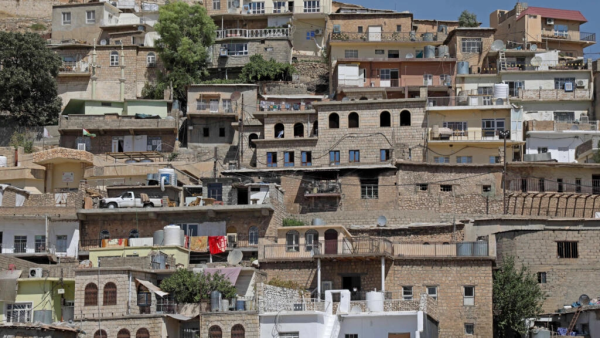The relations between Iraq and Turkey have faced various ups and downs and changes after the formation of new political structures and the independence of Iraq. However, after the Justice and Development Party came to power in Turkey, and Turkey's wide desire to increase its regional role, the relations between these two neighboring countries have seen tension and stability in the past decade.
Areas of tension in relationships
In the past years, despite the emphasis of Turkey's foreign policy on participation, respect for sovereignty, independence, and bilateral territorial integrity, promoting regional and international cooperation; Resolving conflicts through peaceful ways, and strengthening peace, important geopolitical and political variables and factors have caused periodic conflicts and tensions.
JUST IN: The Turkish Defense Ministry said on Sunday that Turkish warplanes “neutralized” 23 Kurdish militants in a raid 140 kilometers (90 miles) inside Iraq. #Turkey #Iraq #Kurds #Syria pic.twitter.com/ObvDPcGFuW
— BNN Newsroom (@BNNBreaking) October 3, 2022
In the geopolitical field, some of Ankara's major goals, including highlighting the role of Turkey as an independent regional power, a nostalgic approach to the former areas of the Ottoman Empire, etc., have faced negative reactions in Iraq. Although Turkey has officially renounced its claim to Mosul, some nationalists and Shia groups in Iraq, say that Ankara's strategy of increasing the influence in Mosul and northern Iraq, expanding relations with Iraqi Turkmen, Muslim Brotherhood supporters, etc., is against the interests of Iraq.
This is while many nationalist political currents and Turkish authorities have a special view on the political, cultural and social rights of Iraqi Turkmens, the fate of Kirkuk, and the Mosul region. On the other hand, the security challenge and the PKK issue in northern Iraq and the 367 km land border between the two countries are still the most important sources of tension in the relations between the two sides.
While the presence of PKK in Iraq is seen as a threat to Turkey's national security, Ankara is putting pressure on Baghdad to expel the PKK and YBS (Sinjar Resistance Units) forces and wants to maintain its military presence (military bases and several thousand) in Iraq.
In this approach, Ankara pursues a kind of "safe zone" project along the Iraqi border with some kind of agreement with the Kurdistan Region (KRG) and military operations in northern Iraq up to a depth of 60 to 70 kilometers. This is a violation of Iraq's territorial integrity.
In fact, in the diplomatic and political dimension, and despite the emphasis on maintaining the territorial integrity and sovereignty of Iraq and confronting the separation of the Kurdistan region from Iraq, Turkey practically considers the right to intervene in Iraq in order to prevent (PKK) attacks against Turkey as its legitimate right. Turkey rarely informs Iraq before its operations.
This is while Baghdad and Iraqi groups still have disagreements with Turkey over issues such as the affiliation of Yazidi militias to the PKK, the cleansing of the PKK, the fight against terrorist groups, the relations of Soleimani with the Syrian Kurdish forces and the PKK, and the control of camps such as 'Makhmur' Refugee camp.
In the meantime, Ankara seems to have a special sensitivity to the kind of relationship between Hashd al-Shaabi and the Patriotic Union of Kurdistan and PKK. In fact, Turkey does not want Shinjar to become the other Qandil, and it does not want PKK to be used as a lever in Iraq's foreign policy against Ankara.
Iran and Turkey Strike Kurdish Rivals in Iraq as Unrest Grips Baghdad https://t.co/e5b1GRNMK1
— Wajeeha (@Wajeeha65827865) September 28, 2022
On the other hand, Baghdad considers Turkey's military approach as an occupation and a clear violation of Iraq's sovereignty. Some Iraqi parties by questioning the legitimacy of Turkey's military presence in Iraq, are considering some approaches such as filing a complaint with the United Nations, reducing relations with Turkey, internationalizing the crisis and even bringing the war to Turkish soil, and embargoing goods and targeting Turkey’s economy.
? The Iraqi Kurdish authorities have themselves come under fire for failing to oppose the attacks, and instead working actively with Turkey.
They have often remained silent while authorities in Baghdad have spoken out.
Learn more here:https://t.co/vsbvuzXfKx
— MedyaNews (@medyanews_) October 3, 2022
While some sources in Iraq speak of 100 Turkish military bases in Iraq, there are still sensitivities over the operations of the Turkish Intelligence Organization in Iraq, the civilian victims of Turkish military operations in the territory of the Kurdistan Region, and the accusation of Turkey's support for the resurgence of ISIS in Iraq.
The water issue is another major cause of tension in relations. Tigris and Euphrates rivers (98% of Iraq's water reserves) originate from Turkey. From Ankara's point of view, Turkey has not made full use of its water resources, and integrated national water projects are considered important for Turkey's economy. But many Iraqi parties blame Turkey for the large reduction in the Tigris and Euphrates water share.
Despite conducting some talks and consultations, Turkey has not given Iraq an important privilege in the field of water until now. But the consequences of Turkey's hydroelectric programs in transboundary rivers are becoming more important for the Iraqi government day by day. In fact, considering the phenomenon of global warming and the important issue of the environment in Iraq, it seems that the dispute over the water case and the guarantee of Iraq's water share will continue.
Areas of cooperation and stability in Iraq-Turkish relations
Cooperation in the field of economy and energy is the most important and stable sector in the relations between the two countries. The two countries are almost complementary in the economic field. Turkey allocated about 5 billion dollars of credit for Iraq at the Kuwait conference (in February 2018). In the meantime, in the past years, the economic relations between the two countries have become more prosperous and trade exchanges have reached about 21-20 billion dollars per year.
返信は固定ツイートを御覧ください#イラン #トルコ #クルド人
クルド人問題は、永遠の課題だな。↓
Iran and Turkey Strike Kurdish Rivals in Iraq as Unrest Grips Baghdad・・・https://t.co/TCjVD0J8Pg
— 元防衛庁キャリア官僚「太田述正」非公式 (@nobumasa_oota) September 30, 2022
While Turkey is the second exporting country to Iraq after China, Iraq's market of 40 million people is one of Turkey's biggest export markets. On the other hand, Iraq's economic development programs in various fields, especially energy, are a good opportunity for cooperation between the two peoples.
Iraq's rich oil and gas resources can be a source for Turkey's energy supply (with about 75% dependence on energy). Ankara still wants to cement its position in the field of Iraq’s energy and invest in energy-rich areas.
In addition, it should be kept in mind that the plan of multilateral corridors and the development of regional transportation projects such as the railway project and the construction of a railway between Turkey and some countries of the Cooperation Council through Kuwait and Iraq can be win-win benefits for each have two countries. In addition to these economic relations, with the opening of border crossings, the expansion of the presence of Iraqi tourists in Turkey and the presence of more Turkish companies in Iraq can also increase.
In addition, despite mechanisms such as the "high-level strategic cooperation council between the two countries, activation of previous intelligence, security and military agreements, expansion of cooperation in the security and military fields with plans such as the sale of Turkish defense and military equipment, airplanes Unmanned, helicopters and advanced weapons can be a factor for stability in the relations between the two sides. In another dimension, other effective factors in the field of cultural diplomacy, carrying out joint cultural and artistic activities, and relying on the common Islamic heritage can also contribute to more stability in the relations between the two neighboring countries.
Vision
Despite the fact that various differences can have a negative effect on the dimensions of cooperation, certainly, two countries can behave in such a way that the field of trade and economy does not suffer from the type of security and geopolitical interactions of the two countries. Meanwhile, trade and investment relations are effective for reducing tension in other fields such as politics, security, and geopolitics.
In fact, despite various factors for the tension in relations, deadly shelling killing and wounding civilians (for which Turkey is blamed) attacks on Turkish military bases in Iraq, and even a complaint against Turkey in the United Nations Security Council, factors such as the formation of an investigation commission, anti-terrorist cooperation against ISIS, etc. can cause stability in the future security and political relations of the two countries. However, the expansion of dialogues and mutual concessions on the water issue and negotiations to guarantee Iraq's water share can still be a factor for more stability in the relations between the two countries.
What is clear is that Turkey's desire to play a role in Iraq continues, and despite challenges such as the summoning of Turkish diplomats by Baghdad, the widespread tension in the relations between the two countries affects the national interests of both actors. However, the areas of cooperation and stability in the relations between the two countries are so wide that they can reduce the political, diplomatic, and security crises.
In fact, opening the channels of dialogue and continuing the meeting of the officials, and emphasizing the political unity of Iraq can still be the basis for more relative stability in the challenging security and geopolitical relations and preventing extensive negative effects on economic and commercial relations.







